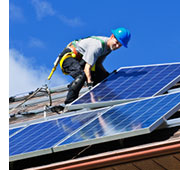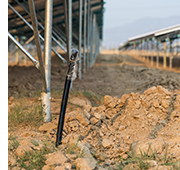
CALL
 Dig safe Stay alert and look up
Injury or possible death can result from contact with any overhead or underground power line, large or small. Even the service wires that run from utility poles to buildings and pumps are potentially dangerous. Keep yourself and all tools and equipment at least 10 feet away from overhead power lines. Only qualified line clearance personnel can work in the 10-foot safety zone. High voltages require a larger safety zone. Before work begins, your crew leader must brief you about power line voltages in your work area and the clearances required to get the job done safely. Make the call |
|
Solar panels and equipment are easily damaged, and they may carry live electrical current even when the sun is not shining. Follow these tips to protect system components—and to protect yourself from electrical shock. Locate all equipment
Avoid conduits, panels and pipes
 Be alert for underground cables So if you’re digging or moving earth in any way near a ground-level solar array, call 811 at least two working days in advance of digging. Also, be sure to consult property owners regarding the location of buried electric cables, so you can dig a safe distance away from them. Would you like to know more? Do you like this email series? |
| #11190 |
 Buried cables that carry electricity from privately owned ground-level solar panels to homes and businesses may not be recognizably marked. In addition, the 811 Call Before You Dig system may not have a record of them.
Buried cables that carry electricity from privately owned ground-level solar panels to homes and businesses may not be recognizably marked. In addition, the 811 Call Before You Dig system may not have a record of them.